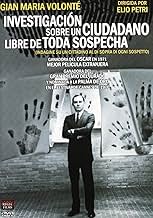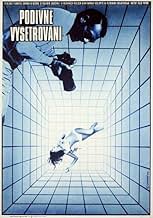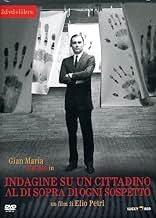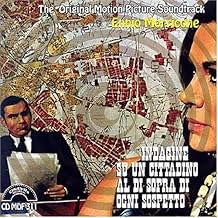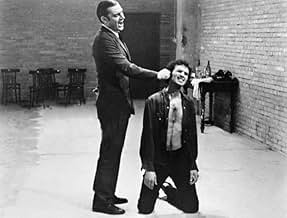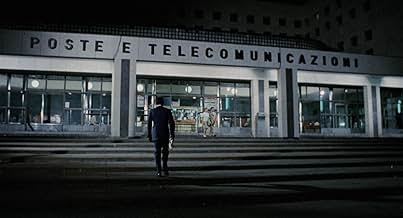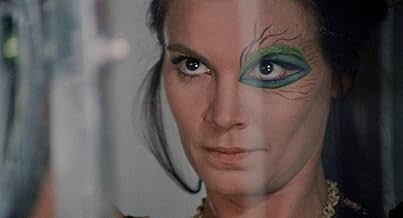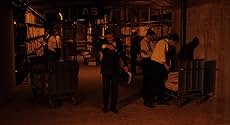VALUTAZIONE IMDb
8,0/10
14.551
LA TUA VALUTAZIONE
Il capo della sezione omicidi uccide la sua amante e lascia deliberatamente indizi per provare la propria colpevolezza.Il capo della sezione omicidi uccide la sua amante e lascia deliberatamente indizi per provare la propria colpevolezza.Il capo della sezione omicidi uccide la sua amante e lascia deliberatamente indizi per provare la propria colpevolezza.
- Regia
- Sceneggiatura
- Star
- Vincitore di 1 Oscar
- 16 vittorie e 6 candidature totali
Recensioni in evidenza
Authority, Order, Power, these are Law's three pillars. Law protects citizens and defends them against crime. Law is made of values and incarnated by men. Those men serve Law, serve citizens and the mission's nobility lies on the fact that it applies to anyone. That's the basis of democracy and the strength of Law. No one is above it. Therefore, in a fair system, anyone can be theoretically suspect. But, the weakness of Law is that it paradoxically implies the use of its main dual medium : repression and punishment which are, after all, the only way to protect the good citizens ... as potential victims. So let's say to make it simpler that Law has two arms, one holding a shield to protect the good citizens and the other holding a sword to punish the bad ones.
One man, called Il Dottore, is holding the sword. He was the former Head of Homicide Squad and leads now the Political Bureau of the Italian Security Court. His speech in the beginning of the film, clearly announces him as a man with palpable fascist tendencies, although the overuse of the word 'fascist' kind of weakens its meaning. This man, incarnated by Gian Maria Volonte, exults the value of a powerful state above any consideration of individual rights. The state must be powerful, authoritarian and any ideas that threaten Law and Order, should be mercilessly fought. It's too simplistic to call this 'fascism', some would say fascism was born in Italy, which would explain that the ideas of a man like Il Dottore could be impregnated by a certain fascist vision but they'd be forgetting that Italy is also the country of Machiavelli, and the whole plot of this psychological political thriller could be considered as a deep, Machiavellian character study.
Il Dottore is fascist in his beliefs and Machiavelian in his acts, two contradictions that totally cancel each other out and makes him more of a very interesting pathological case of egomania. The man wants to prove that the very system that maintains Law and Order, Police and Justice, is flawed because it ensures the existence of citizens beyond suspicion. This man wants to denounce the main obstacle, the thing that makes his job ethically useless. The mission sounds noble... except that the way he chose to prove his point is the act of a maniac. A crime to denounce, to make the point he himself incarnates, that there are some citizens above suspicion. So high above this suspicion that they can leave clues to denounce themselves without never being worried. Because people believe in men who incarnate order. Power's aura seems more efficient than its use. Power relies on its own abuse.
And that's the theme of the film. What is power? Il Dottore incarnates it with such charisma and virile magnetism that whatever comes off his mouth sounds like the truth. If he says he's guilty, it can't be anything but irony or sarcasm. The simple thought that he could be guilty of the crime he committed sounds like a blasphemy. Indeed, the power is a deified notion. And like the power of God is perceived in our everyday life, the same goes for Law. Order is real, and can't be based on abstraction. The paradox is that an abstraction is not palpable enough to be respected. Fear of punishment controls people more than interests, as said Machiavelli. Therefore, it is no surprise that socialism is considered as an escapism from individual interests and therefore can understand only one language : repression. Il Dottore handles the questioning of the left-wing activists just as if he had personal reasons to fight them, because they're the most likely people to legitimate the use of repressive violence.
Indeed, it is personal. Jealousy, weakness, humiliation, power is represented by men, who are flawed. This is a brilliant character study of a man using power as an artifice to disguise his weaknesses. He's the Law but he's a citizen, he's power and he's powerless. His interactions with his victim totally deconstruct the character, and extinguish the aura and prestige he incarnates for his men. With this woman, his authority is like the toy the little boy proudly shows. Power allows him to run a red light or share some gross crime-related experiences, so voyeur it sounds childish. They're big children but they have the power. So, whom the power belongs to ? Women? Anarchists? Who's the leader? the system ? No, what leads the world is only human judgment ... The truth is in its appearance and this is what guides human perception.
Il Dottore denounces these fallacious perceptions in such an original way, we also can't believe this man has this status and is so respected, which makes us question the legitimacy of some our leaders ... after all, men are men, and behind every great man, there's a woman, and who really knows how these so-called great men behave with these women? Gian Maria Volonte gives us a hint through an extraordinary performance. In the cinematic world of character studies, Il Dottore is a living paradox highlighting our own weaknesses as men who believe in a system of powers, or our owns for the luckiest ones. His charisma makes him all the more pathetic in some key scenes and his pathos more admirable in some others. Elio Petri's investigation is a fascinating political thriller whose introspectively paranoid feeling is sublimated by Ennio Morricone's score.
"Investigation of a Citizen Above Suspicion" is an intelligent masterpiece denouncing the paradoxical nature of Law where the holders of the sword tend to fight those who hide themselves behind the shield while the shield protects only those who use the sword. Gian Maria Volonte is the soul of this contradiction.
One man, called Il Dottore, is holding the sword. He was the former Head of Homicide Squad and leads now the Political Bureau of the Italian Security Court. His speech in the beginning of the film, clearly announces him as a man with palpable fascist tendencies, although the overuse of the word 'fascist' kind of weakens its meaning. This man, incarnated by Gian Maria Volonte, exults the value of a powerful state above any consideration of individual rights. The state must be powerful, authoritarian and any ideas that threaten Law and Order, should be mercilessly fought. It's too simplistic to call this 'fascism', some would say fascism was born in Italy, which would explain that the ideas of a man like Il Dottore could be impregnated by a certain fascist vision but they'd be forgetting that Italy is also the country of Machiavelli, and the whole plot of this psychological political thriller could be considered as a deep, Machiavellian character study.
Il Dottore is fascist in his beliefs and Machiavelian in his acts, two contradictions that totally cancel each other out and makes him more of a very interesting pathological case of egomania. The man wants to prove that the very system that maintains Law and Order, Police and Justice, is flawed because it ensures the existence of citizens beyond suspicion. This man wants to denounce the main obstacle, the thing that makes his job ethically useless. The mission sounds noble... except that the way he chose to prove his point is the act of a maniac. A crime to denounce, to make the point he himself incarnates, that there are some citizens above suspicion. So high above this suspicion that they can leave clues to denounce themselves without never being worried. Because people believe in men who incarnate order. Power's aura seems more efficient than its use. Power relies on its own abuse.
And that's the theme of the film. What is power? Il Dottore incarnates it with such charisma and virile magnetism that whatever comes off his mouth sounds like the truth. If he says he's guilty, it can't be anything but irony or sarcasm. The simple thought that he could be guilty of the crime he committed sounds like a blasphemy. Indeed, the power is a deified notion. And like the power of God is perceived in our everyday life, the same goes for Law. Order is real, and can't be based on abstraction. The paradox is that an abstraction is not palpable enough to be respected. Fear of punishment controls people more than interests, as said Machiavelli. Therefore, it is no surprise that socialism is considered as an escapism from individual interests and therefore can understand only one language : repression. Il Dottore handles the questioning of the left-wing activists just as if he had personal reasons to fight them, because they're the most likely people to legitimate the use of repressive violence.
Indeed, it is personal. Jealousy, weakness, humiliation, power is represented by men, who are flawed. This is a brilliant character study of a man using power as an artifice to disguise his weaknesses. He's the Law but he's a citizen, he's power and he's powerless. His interactions with his victim totally deconstruct the character, and extinguish the aura and prestige he incarnates for his men. With this woman, his authority is like the toy the little boy proudly shows. Power allows him to run a red light or share some gross crime-related experiences, so voyeur it sounds childish. They're big children but they have the power. So, whom the power belongs to ? Women? Anarchists? Who's the leader? the system ? No, what leads the world is only human judgment ... The truth is in its appearance and this is what guides human perception.
Il Dottore denounces these fallacious perceptions in such an original way, we also can't believe this man has this status and is so respected, which makes us question the legitimacy of some our leaders ... after all, men are men, and behind every great man, there's a woman, and who really knows how these so-called great men behave with these women? Gian Maria Volonte gives us a hint through an extraordinary performance. In the cinematic world of character studies, Il Dottore is a living paradox highlighting our own weaknesses as men who believe in a system of powers, or our owns for the luckiest ones. His charisma makes him all the more pathetic in some key scenes and his pathos more admirable in some others. Elio Petri's investigation is a fascinating political thriller whose introspectively paranoid feeling is sublimated by Ennio Morricone's score.
"Investigation of a Citizen Above Suspicion" is an intelligent masterpiece denouncing the paradoxical nature of Law where the holders of the sword tend to fight those who hide themselves behind the shield while the shield protects only those who use the sword. Gian Maria Volonte is the soul of this contradiction.
If the crime, corruption , comes from who is expected to judge or to combat the crime ( judges , policemen)the chances that you will not pay for it is infinitely lesser than if are not part of the system.
Some comments in light of previous descriptions of the movie.
This movie is definitively about state violence. Even if to a viewer that has no foreknowledge of the police state that was instituted in Italy (with the help of the CIA as the movie alludes to) in order to keep the Communist Party from taking power (the PCI had the biggest following of any parties at that time), the fact remains that the movie is not much more surreal than the socio-political reality facing the film-maker.
Murders and "suicides" (while in police custody) of left-wing political activists and of anarchists are a fact that Elio Petri was painfully aware of. He made a documentary called "Streghi dello stato" "witches of the state" where Jean Maria Volonte and others expose such "suicides". Elio Petri was politically aware and through out his work there is criticism of the right wing of Italian politics (see TODO MORO).
I think that the movie is most powerful once you are aware of the fact that you can be victimized at the hands of an institution, esp. at the hands of an institution that exists only to maintain political order. Once the politicization of the priorities of those institutions that have the legitimate use of violence occurs, than meaningless violence towards the innocent will be allowed if punishing it would impair the political functions of the state machinery. Flora Balkan is perhaps a symbol for the masses, their love of violence and power, their love for the undoing of their freedoms.
A very fine movie that requires some effort, but that is always actual - thanks to an interesting narration of human nature. The movie does have it's flaws and i the action is not as invigorated as one expects it to be after the first 15 minutes, neither is the camera work at the level it has to be for this movie to be the greatest ever but it is still a hell of a great movie.
Whether or not you agree with this movie's negative portrayal of state violence and of that primal attraction that violence has (explored in a marvelously Mediterranean style in this movie) for so many could make the difference in how much you are puzzled by the movie. If you see it a a satire of power and violence - it might work.
This movie is definitively about state violence. Even if to a viewer that has no foreknowledge of the police state that was instituted in Italy (with the help of the CIA as the movie alludes to) in order to keep the Communist Party from taking power (the PCI had the biggest following of any parties at that time), the fact remains that the movie is not much more surreal than the socio-political reality facing the film-maker.
Murders and "suicides" (while in police custody) of left-wing political activists and of anarchists are a fact that Elio Petri was painfully aware of. He made a documentary called "Streghi dello stato" "witches of the state" where Jean Maria Volonte and others expose such "suicides". Elio Petri was politically aware and through out his work there is criticism of the right wing of Italian politics (see TODO MORO).
I think that the movie is most powerful once you are aware of the fact that you can be victimized at the hands of an institution, esp. at the hands of an institution that exists only to maintain political order. Once the politicization of the priorities of those institutions that have the legitimate use of violence occurs, than meaningless violence towards the innocent will be allowed if punishing it would impair the political functions of the state machinery. Flora Balkan is perhaps a symbol for the masses, their love of violence and power, their love for the undoing of their freedoms.
A very fine movie that requires some effort, but that is always actual - thanks to an interesting narration of human nature. The movie does have it's flaws and i the action is not as invigorated as one expects it to be after the first 15 minutes, neither is the camera work at the level it has to be for this movie to be the greatest ever but it is still a hell of a great movie.
Whether or not you agree with this movie's negative portrayal of state violence and of that primal attraction that violence has (explored in a marvelously Mediterranean style in this movie) for so many could make the difference in how much you are puzzled by the movie. If you see it a a satire of power and violence - it might work.
A chief of detectives (Gian Maria Volontè), homicide section, kills his mistress (Florinda Bolkan) and deliberately leaves clues to prove his own responsibility for the crime.
I absolutely loved this film. It is part crime thriller, part detective story, and a bit of political corruption. Being Italian and having an Italian sensibility, it reminded me more than a little bit of the giallo film genre. But yet, it was distinct. The giallo is in some ways the precursor to the slasher, and this was not that sort of film -- not gory and the killer is not a masked and gloved man.
What really stands out is the score from Ennio Morricone. He has made many scores over the years and without exception they have been quite good. Is he the best composer of the 20th century? Maybe. And I would daresay this is among his very best, easily in the top three. The score alone makes the film worth watching.
I absolutely loved this film. It is part crime thriller, part detective story, and a bit of political corruption. Being Italian and having an Italian sensibility, it reminded me more than a little bit of the giallo film genre. But yet, it was distinct. The giallo is in some ways the precursor to the slasher, and this was not that sort of film -- not gory and the killer is not a masked and gloved man.
What really stands out is the score from Ennio Morricone. He has made many scores over the years and without exception they have been quite good. Is he the best composer of the 20th century? Maybe. And I would daresay this is among his very best, easily in the top three. The score alone makes the film worth watching.
The final scene in Elio Petri's 1970 Investigation of a Citizen Above Suspicion concludes with a quote from Kafka's The Trial: "Whatever he may seem to us, he is yet a servant of the Law; that is, he belongs to the Law and as such is set beyond human judgment." What Petri has left out from this excerpt is also that "to doubt his integrity is to doubt the Law itself". The "he" in question here is the man of the Law the police inspector played brilliantly, hair slicked back et al, by Gian Maria Volontè. Without any scruples, we see the Inspector coldly cut his mistress's throat with a razor between the sheets in a kinky role-playing romp, sans scruples, only to prove to himself if he is, as he believes, a citizen above suspicion and beyond the Law which he so firmly adheres to.
This complex film is a cinematic gem thanks to its multifarious tropes at times absurd black comedy, at times vitriolic political satire, at times psychological study into sexual fetishism and power. Of course, all of these themes intermingle so effortlessly that you can't help but be taken aback by the richness of Petri's byzantine vision. The left-leaning director here depicts the autocratic terror that overtook Italy in the late 60s, an overture to the tense, decade-long period known as the "years of lead" in Italian politics a time of fascist repression and a struggle between the equally-as-extreme left and right of center parties.
Beyond its political overtones (which are universal yet now paradoxically outdated, as we see rebellious students waving their little red Maoist books around to anger the "fascist pigs" in the police force), Investigation plays its strongest and most universal hand in its view of authority, and specifically, those that wield an ungodly amount of it. The Inspector, in a snug, black suit, commands and degrades his subordinates, yet in the way a responsible teacher would reprimand a naughty student. That is, he believes his own righteousness and position, and here, once he commits the murder of Augusta Terzi (the stunning Florinda Bolkan), he leaves the Law to spin its wheels of Justice, having full confidence in the organ of power that commands him. As the Inspector sits in the office of his boss, the Commissioner (a sleazy Gianni Santuccio), he trembles like a child, waiting for approval and acceptance. After the latter admits to having an affair with the murdered victim, the unperturbed Commissioner asks him amidst a smoke-filled smirk, holding a cigar in his fat fingers, "So, was she, you know? Any good?" Here we can make the link between power and sexual impotence, as the simple reason the Inspector kills his lover is because she has brought to light his personal inadequacies as a man. An individual who holds such dominance over others, who commands such authority, is an addictive aphrodisiac for Bolkan's underwear-hating heroine, but after a while, she sees her Inspector is nothing more than a capricious child obsessed and deceived with a position of power that holds no integrity and no truth. For her, his sexual appeal has vanished, the organ of dominance has grown limp, as the incongruity between the Inspector's projected image and his actual self begins to grow. She hates his little black socks, his dull black suit, and his overall bureaucratic appearance. In a few great satirical moments, we see the impressionable Inspector strolling the streets in a trendy new khaki suit, a purple silk ascot, fashionable sunglasses a caricature of Italian culture to the fullest.
So what prompts Volontè's Inspector to make his final decision? Is he a stern follower of the Law who wants to test it and prove himself superior to his inept colleagues; a sadistic neofascist bureaucrat who lives for control and subjugation of others; an infantile with a bruised ego thanks to an untamable feminine force? Are we, as viewers, not to question his actions, but simply to accept them as necessary because he's "a man of the Law", superior to us, despite his faults, as Kafka leads us to believe or is that just Petri's tongue-in-cheek humor getting the best of us? That's the fun of this great film, and the kookiness of Ennio Morricone's twangy score adds to the comical effect of a dark and witty étude into power, sex, and politics.
This complex film is a cinematic gem thanks to its multifarious tropes at times absurd black comedy, at times vitriolic political satire, at times psychological study into sexual fetishism and power. Of course, all of these themes intermingle so effortlessly that you can't help but be taken aback by the richness of Petri's byzantine vision. The left-leaning director here depicts the autocratic terror that overtook Italy in the late 60s, an overture to the tense, decade-long period known as the "years of lead" in Italian politics a time of fascist repression and a struggle between the equally-as-extreme left and right of center parties.
Beyond its political overtones (which are universal yet now paradoxically outdated, as we see rebellious students waving their little red Maoist books around to anger the "fascist pigs" in the police force), Investigation plays its strongest and most universal hand in its view of authority, and specifically, those that wield an ungodly amount of it. The Inspector, in a snug, black suit, commands and degrades his subordinates, yet in the way a responsible teacher would reprimand a naughty student. That is, he believes his own righteousness and position, and here, once he commits the murder of Augusta Terzi (the stunning Florinda Bolkan), he leaves the Law to spin its wheels of Justice, having full confidence in the organ of power that commands him. As the Inspector sits in the office of his boss, the Commissioner (a sleazy Gianni Santuccio), he trembles like a child, waiting for approval and acceptance. After the latter admits to having an affair with the murdered victim, the unperturbed Commissioner asks him amidst a smoke-filled smirk, holding a cigar in his fat fingers, "So, was she, you know? Any good?" Here we can make the link between power and sexual impotence, as the simple reason the Inspector kills his lover is because she has brought to light his personal inadequacies as a man. An individual who holds such dominance over others, who commands such authority, is an addictive aphrodisiac for Bolkan's underwear-hating heroine, but after a while, she sees her Inspector is nothing more than a capricious child obsessed and deceived with a position of power that holds no integrity and no truth. For her, his sexual appeal has vanished, the organ of dominance has grown limp, as the incongruity between the Inspector's projected image and his actual self begins to grow. She hates his little black socks, his dull black suit, and his overall bureaucratic appearance. In a few great satirical moments, we see the impressionable Inspector strolling the streets in a trendy new khaki suit, a purple silk ascot, fashionable sunglasses a caricature of Italian culture to the fullest.
So what prompts Volontè's Inspector to make his final decision? Is he a stern follower of the Law who wants to test it and prove himself superior to his inept colleagues; a sadistic neofascist bureaucrat who lives for control and subjugation of others; an infantile with a bruised ego thanks to an untamable feminine force? Are we, as viewers, not to question his actions, but simply to accept them as necessary because he's "a man of the Law", superior to us, despite his faults, as Kafka leads us to believe or is that just Petri's tongue-in-cheek humor getting the best of us? That's the fun of this great film, and the kookiness of Ennio Morricone's twangy score adds to the comical effect of a dark and witty étude into power, sex, and politics.
Lo sapevi?
- QuizFirst part of the "Trilogy of Neurosis", also including La classe operaia va in paradiso (1971) and La proprietà non è più un furto (1973).
- Citazioni
Il Dottore - Former head of homicide squad: The people are underage, the city is sick. Others are tasked with educating and curing this. Our duty is to repress it! The repression is our vaccine! Repression and civilization!
- Curiosità sui creditiBefore the end credits: "Whatever impression he makes on us, he is the servant of the Law. He belongs to the Law and is not answerable to human judgement..." Franz Kafka
- Versioni alternativeThe subtitled American version distributed by Columbia has slight differences in the credits. The Italian version opens with blank white-on-black credits (as many other Petri films do). The American version projects the credits onto the opening scene with the Dottore walking around the street. Both the opening and the closing credits (including the film's title and the Kafka quotation) are translated to English as well.
- ConnessioniEdited into Colpiti al cuore (2019)
I più visti
Accedi per valutare e creare un elenco di titoli salvati per ottenere consigli personalizzati
- How long is Investigation of a Citizen Above Suspicion?Powered by Alexa
Dettagli
- Data di uscita
- Paese di origine
- Lingua
- Celebre anche come
- Investigation of a Citizen Above Suspicion
- Luoghi delle riprese
- Azienda produttrice
- Vedi altri crediti dell’azienda su IMDbPro
Botteghino
- Lordo Stati Uniti e Canada
- 265.470 USD
- Tempo di esecuzione
- 1h 55min(115 min)
- Mix di suoni
- Proporzioni
- 1.85 : 1
Contribuisci a questa pagina
Suggerisci una modifica o aggiungi i contenuti mancanti



